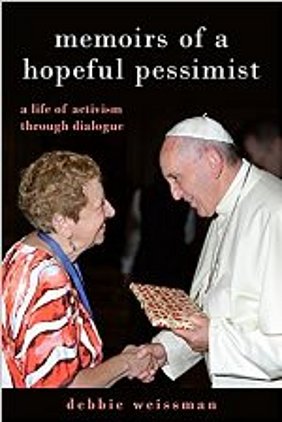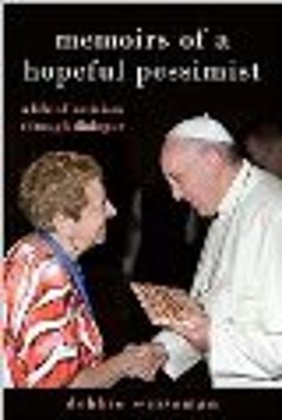Dr. Debbie Weissman was born in 1947, just after the Shoah and just before the establishment of the State of Israel. Her memoirs, entitled Memoirs of a hopeful pessimist – a life of activism through dialogue, are not only an account of life events, as much as a travel book. She does describe milestones in her life, both the spiritual and mundane, her career and activism, but above all she brings the reader along on her travels, the physical ones and the philosophical ones. It’s a fast-paced book, witty and to-the-point, and those who have met her in person will hear her voice emitting from the pages.
In her opening chapter, Debbie quotes a Chinese curse that reads “May you live in an interesting time”, and adds that she feels blessed to do so. She toys with the idea that she is an “unlikely memoirist”, and that her memoirs really are a collection of short stories. Personally, I am glad that she has used this format, because it creates a vivid backdrop to her thoughts and memories. And while the tone of the book is very much Debbie’s, she allows the people she meets to be the main characters. It’s humble, and humbling.
Debbie’s life story unfolds parallel to the history of feminism, and the history of Israel. She writes that she made Aliyah to “a largely secular, left-leaning country” and that she now lives in “a right-wing, religious and traditional society”. While voicing her criticism on the policies of the State of Israel vis-à-vis its Palestinian neighbors, she remains cautiously optimistic for a solution, and as a dialogue activist she had no doubt instilled hope in those she has engaged in dialogue with. She mentions that she has lived to see the Berlin Wall being torn down, the end of Apartheid in South Africa and a black man being elected, and re-elected as the President of the United States. She too, served two terms – as the first Jewish, female President of the International Council of Christians and Jews, which aptly illustrates the ground-breaking progress made during the past decades.
I am particularly fond of her short anecdote about learning sign language as a way to communicate with a friend across the classroom, after having been separated by an annoyed teacher. I imagine this says a lot about Debbie and her personality. She believes fervently in communication and meeting the Other, despite the pain it might entail. Her musings on Purim and historic anger are essentially concise advice on anger management, and can be applied to a wide range of relationships besides the one between neighbors and partners in dialogue. I get the impression that Debbie is deeply self-critical, but not in the sense that she puts herself down, rather that she demands progress from herself. She writes that the Twelve Calls of Berlin may be the first time that Christians and Jews have been self-critical in each other’s presence; indeed an important step in the relationship between Christians and Jews. And no doubt, self-criticism will be needed as the dialogue between Christians, Jews and Muslims progresses.
What have I learned from Debbie’s memoirs? I have learned that dialogue takes time, and that we must let it take time, despite our eagerness to move ahead. I have also learned that one needs to travel to fully understand where one comes from. Her memoirs are deeply serious – although I suspect that the long-lost memoirs she wrote at the age of six might have been even more serious – and hilariously funny. A notable feminist and educator, Debbie is also a prominent example of a Jewish comedienne. I must admit that some tears were shed on my part while reading her book – and while some were due to her moving accounts, most were tears of laughter. Fitting, contrasts being one of the key themes of the book.
I started by calling Debbie’s memoirs a travel book. I will finish by calling it a love story. Debbie’s accounts on teaching, travelling and engaging in dialogue are nothing short of love stories. As are her writings on Israel and particularly Jerusalem as a multicultural, multiethnic and multi-religious city. Debbie is one of the few people who can honestly say that she has prepared gefilte fish and visited Arafat’s grave on the same day. How lucky we are that she, despite being a busy retiree, decided to write down this collection of stories.



